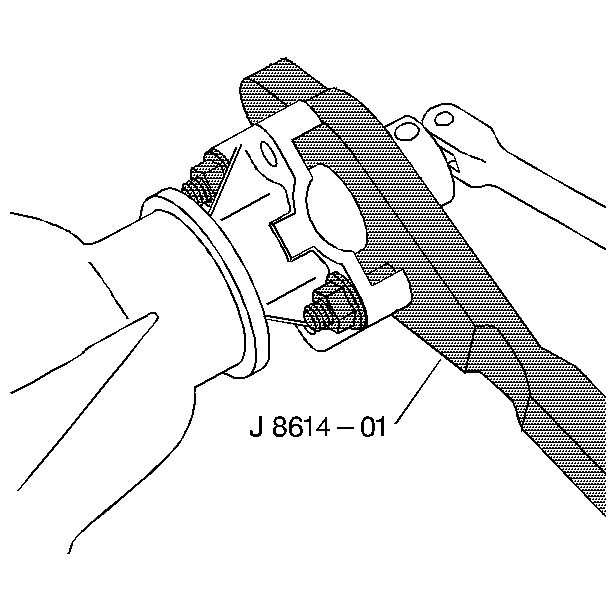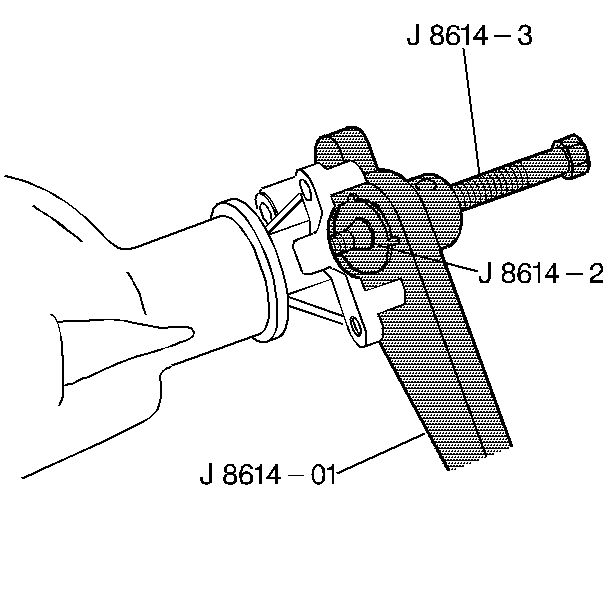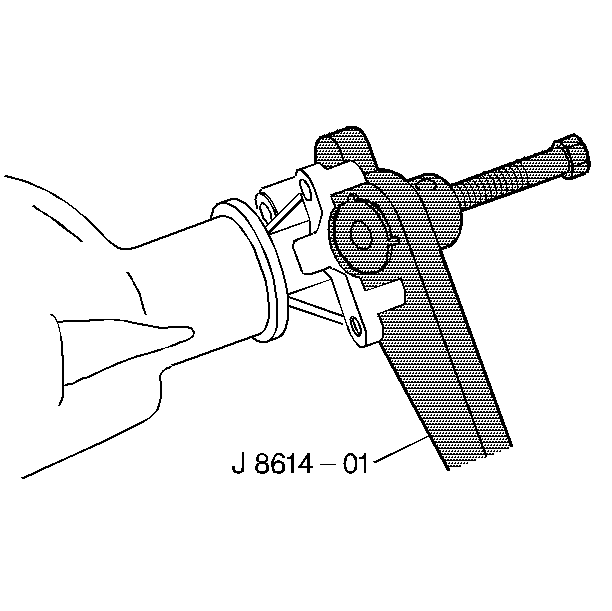Removal Procedure
Tools Required
J 8614-01 Companion
Flange Holder
- Raise and support the vehicle. Refer to
Lifting and Jacking the Vehicle
in General Information.
- Remove the rear wheels. Refer to
Tire and Wheel Removal and Installation
in Tires and Wheels.
- Remove the drums, if equipped. Refer to
Brake Shoe Replacement
in Drum Brakes.
- Remove the rear rotors, if equipped. Refer to
Rear Brake Rotor Replacement
in Disc Brakes.
- Remove the propeller shaft. Refer to the appropriate procedure
in Propeller Shaft:

- Measure the amount of
torque required in order to turn the pinion. Use an inch-pound torque wrench.
Record this measurement for reassembly. This will provide the combined
preload for the following components:
- Draw an alignment mark on the following components:
- Record the number of exposed threads on the pinion stem for
reference.

- Remove the pinion flange
nut and washer. Hold the pinion flange using a J 8614-01
.

- Remove the pinion flange
using the J 8614-01
. Use
a container in order to retrieve the lubricant.
Installation Procedure
Tools Required
J 8614-01 Companion
Flange Holder

- Apply a seal lubricant
to the outside of the pinion flange.
Important: Do not hammer the pinion flange onto the pinion stem.
- Install the pinion flange.

Notice: Use the correct fastener in the correct location. Replacement fasteners
must be the correct part number for that application. Fasteners requiring
replacement or fasteners requiring the use of thread locking compound or sealant
are identified in the service procedure. Do not use paints, lubricants, or
corrosion inhibitors on fasteners or fastener joint surfaces unless specified.
These coatings affect fastener torque and joint clamping force and may damage
the fastener. Use the correct tightening sequence and specifications when
installing fasteners in order to avoid damage to parts and systems.
- Install the washer
and a new nut.
Tighten
Tighten the nut on the pinion stem as close to the original marks as
possible without turning the nut past the mark. Use the reference mark and
the thread count as a reference. Tighten the nut slightly. Turn the
pinion flange several times after each tightening in order to set the
rollers.

Important: If the original preload torque value was less than 0.34 N·m
(3 lb in), reset the torque specification to 0.34-0.56 N·m
(3-5 lb in).
- Measure the torque required to rotate the pinion, using an inch-pound
torque wrench. Compare this value with the rotating torque recorded earlier.
Continue to tighten and measure until you obtain the same preload.
- Install the propeller shaft. Refer to the appropriate procedure
in Propeller Shaft:
- Install the rear rotors, if equipped. Refer to
Rear Brake Rotor Replacement
in Disc Brakes.
- Install the drums, if equipped. Refer to
Brake Shoe Replacement
in Drum Brakes.
- Install the rear wheels. Refer to
Tire and Wheel Removal and Installation
in Tires and Wheels.
- Replenish the rear axle with new lubricant as needed.
- Lower the vehicle.






